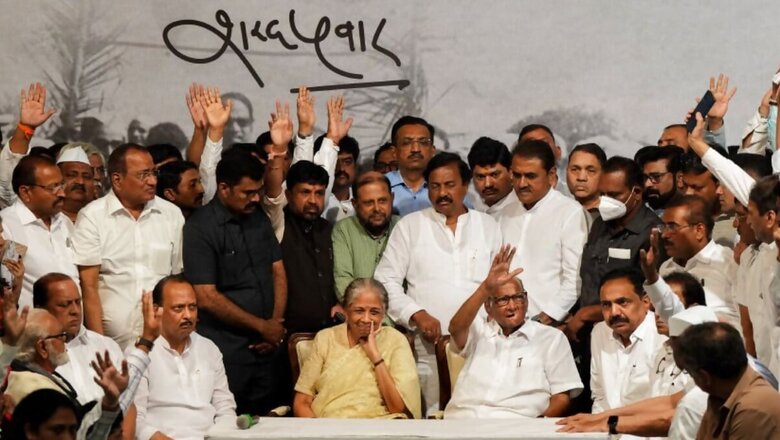
views
In a bid to get an upper hand within a fragmented and ideologically diverse Nationalist Congress Party, clever fox Sharad Pawar has taken a gamble of sorts in offering to resign as the NCP supremo. Pawar’s sudden decision to step down as a head is aimed at either taking back full control of the party that he had formed in June 1999 with a combination of passion and ambition.
It is an open secret that Pawar, for the past few weeks, had been trying to restore a semblance of unity among NCP leaders without much success. A section of the NCP was reportedly negotiating with the BJP and attempting to get out of the Maha Vikas Aghadi (MVA) coalition consisting of the Congress, NCP and Shiv Sena [Udhav]. Amid weak denials, talks of Pawar’s nephew Ajit meeting Amit Shah and other BJP stalwarts were constantly in Mumbai media. While there is no empirical evidence or a formal head count, the possibility of a bulk of NCP MLAs siding with the Narendra Modi and BJP-Shinde-led Sena seemed greater than those opting for Uddhav Thackeray and Rahul Gandhi-controlled parties.
In this sense, Pawar’s resignation, withdrawal or the issue of Pawar’s successor, holds the key to pointing out which way the breakaway Congress is heading. At a broader level, the NCP’s internal dynamics would have a bearing on the 2024 Lok Sabha polls too. In the 2019 Lok Sabha elections, the BJP and the then-united Sena had netted 42 out of 48 Lok Sabha seats. For 2024, a script was sought to be readied had Ajit Pawar managed to walk away with a bulk of NCP MLAs. The split in the NCP would have had a crippling effect not only on MVA but on the Congress in western Maharashtra where it teams up with the NCP.
Until May 2, 2023 Ajit Pawar was seen as a strong contender to topple Pawar much like Chandrababu Naidu had edged out father-in-law N T Ramarao or how Akhilesh Yadav had outwitted father Mulayam Singh Yadav. But now, Ajit Pawar would have to formally rebel and show his clout among MLAs. Going by the emotional and dramatic scenes in Mumbai, Ajit Pawar’s hands seem forced and out of depth.
Has Sharad Pawar been successful in averting the crisis? It appears to be the case or it’s too early to make such a claim. After all, splits in the regional parties have wheels within wheels. Post-2014, some of these divisions merit OTT web series having a heavy dose of emotional drama, family feud and intrigue.
Pawar has been a seasoned campaigner in the art of doublespeak. Barely a month ago, he had stunned the Congress and non-NDA Opposition when he abruptly opposed Rahul Gandhi’s call for a parliamentary probe into the Adani Group over a report by US short-seller Hindenburg Research. The move had come barely days after Rahul had haphazardly accepted Pawar’s advice not to target Hindutva icon Vir Savarkar, ostensibly, for the sake of Opposition unity for the 2024 Lok Sabha. The precarious compromise has left Rahul with eggs on his face.
A politician among politicians, Pawar, 83 now, holds a record of sorts having never lost an electoral battle, a distinction that eluded even former prime ministers like Indira Gandhi and Atal Bihari Vajpayee.
As I had mentioned in an earlier News 18 blog, looking back at Pawar’s impressive political career, the politician offers a bag full of turning the tables on friends and associates. He became Maharashtra’s chief minister for the first time aged just 38 in 1978 when he treacherously toppled the Congress government of Vasantdada Patil, split the party, and formed a government in coalition with the Janata Party under the banner of the Progressive Democratic Front.
In 1997-98, the emergence of Sonia Gandhi as supreme leader of the Congress rattled Pawar. A few days before he, P.A. Sangma and Tariq Anwar revolted against Sonia on grounds of her foreign origins in May 1999, Pawar had hosted a soiree on the rear lawns of his Gurudwara Rakabganj Road bungalow which most thought, quite mistakenly, was in celebration of Sonia handing him charge of negotiations with Jayalalitha and other potential allies. Pawar in a crisp white bush-shirt chose to serve burgundy Baramati wine with a tale. “Actually, I told my leader (till then, still Sonia) that I am a visionary because I signed up an Italian collaborator for producing this wine 20 years ago.” He revealed that for the past many years, he was growing a variety of grapes called Sharad Seedless named after him and has been championing the cause of wine.
Pawar seemed all reconciled to accept Sonia as his leader. However, on May 17, 1999, everyone in the Congress Working Committee (CWC) meeting called to finalise candidates for the Goa Assembly polls was growing restless, dying to catch up with India’s cricket World Cup opener in England. Then Sharad Pawar smiled and P.A. Sangma stood up. When the mighty Maratha signalled, the diminutive Samurai with a swish of his razor-sharp tongue built a case for how the BJP campaign against Sonia Gandhi’s foreign origin was seeping deep down to even remote villages. Then came the unkindest cut. “We know very little about you, about your parents,” Sangma told her.
Mastermind Pawar had planned a revolt when a woman bureaucrat from Maharashtra had told Pawar that she had got a survey done which revealed that if he revolts against Sonia on grounds of her foreign origins, he would be hailed as “second Lokmanya Tilak.” It is a different story that when the Maharashtra Assembly polls were held, Pawar’s newly formed Nationalist Party of India finished behind the Congress and the rebel had to form a coalition government playing the role of a minor partner in the state that he once considered his fiefdom.
Having failed to emerge as a “second Lokmanya Tilak” then, what is Pawar up to in 2023? We would have an answer perhaps in a fortnight from now.
The writer is a Visiting Fellow at the Observer Research Foundation. A well-known political analyst, he has written several books, including ‘24 Akbar Road’ and ‘Sonia: A Biography’. The views expressed in this article are those of the author and do not represent the stand of this publication.
Read all the Latest Opinions here



















Comments
0 comment